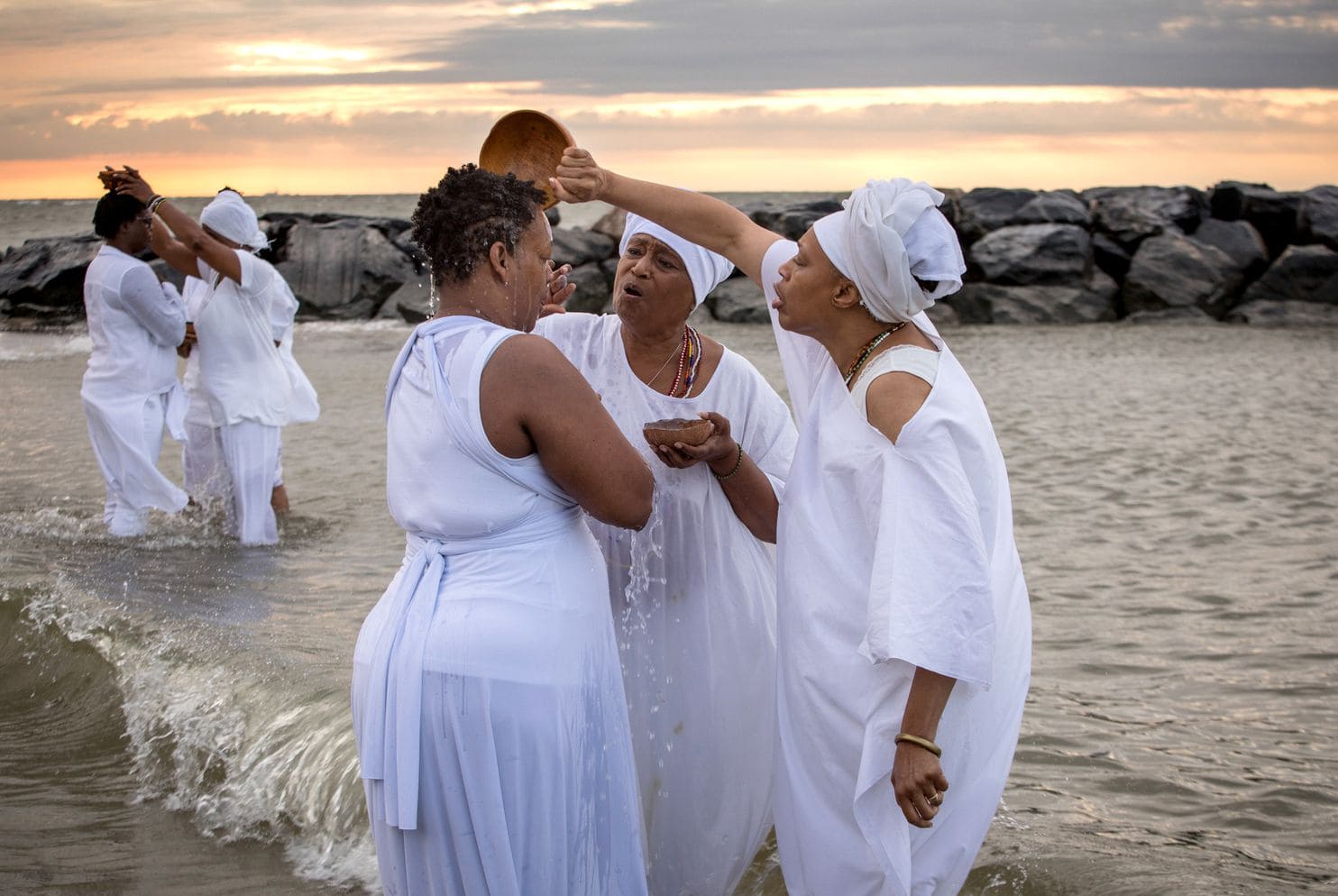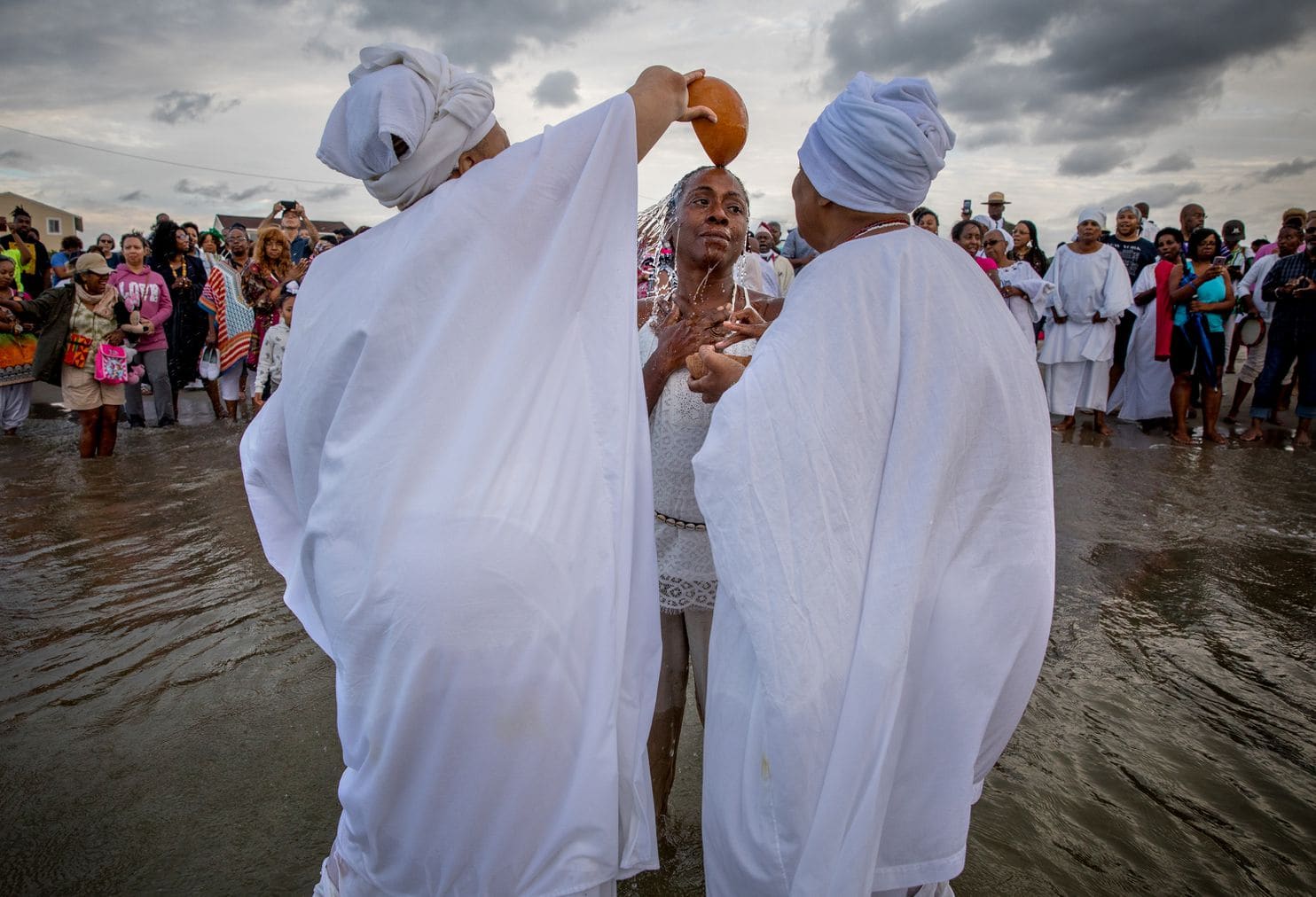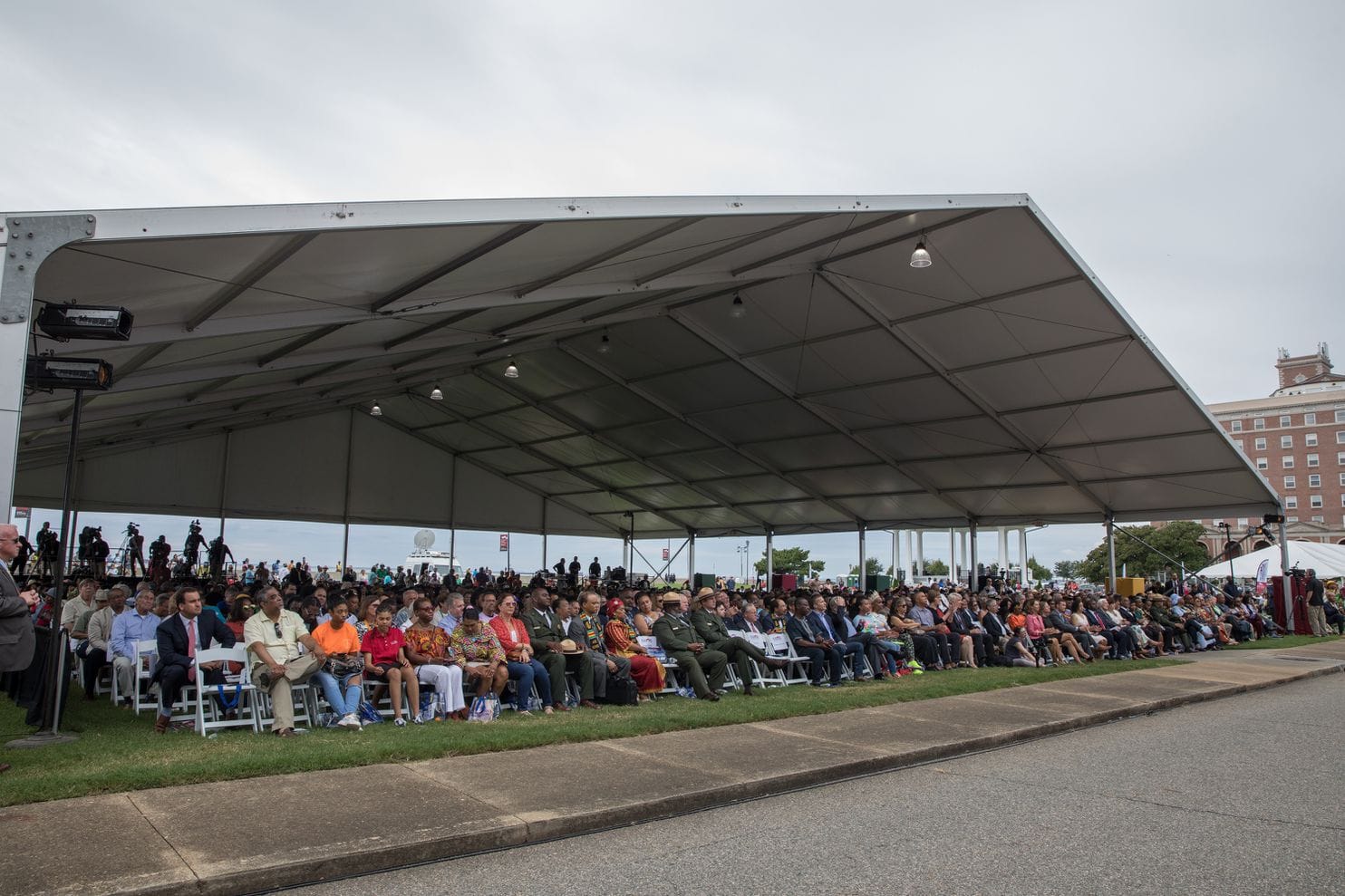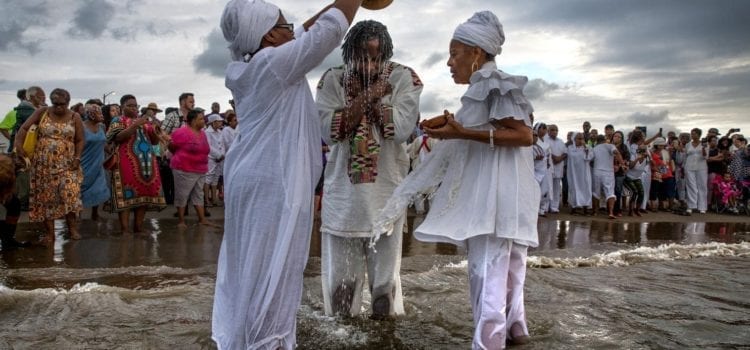HAMPTON, Va. —They faced the sunrise to the rhythm of drums and waves on a windswept beach, dozens wearing white, near the spot where the first enslaved Africans arrived at the English colony of Virginia in 1619. On Saturday morning, they would release those spirits.
The cleansing and naming ritual, presided over by visiting chiefs from Cameroon, kicked off a weekend of events marking the 400th anniversary of the Africans’ arrival and the dawn of American slavery.

“The water was warm and salty,” said Tiffini Mason Johnson, who lives in Cockeysville, Md., emerging after a ceremony with women from an African cultural group. “They told me to just release myself, that I am released of anger and fear, and my grandmothers through me.”
The question of release hung over a day that walked a fine line: commemorating the nation’s fundamental sin of slavery but also celebrating the African descendants who survived its brutality and helped build America.
“Our perseverance, making it through 400 years, is something that should be honored,” said Terry E. Brown, who is African American and the National Park Service’s superintendent for Fort Monroe, the site of the first landing.

He started the day a few miles up the beach at Buckroe, watching the African ritual, standing out in his green uniform. He took off his hat, bobbed his head to the drums. “It’s honorable, it’s reflective and just connects me back to 400 years. I’m on a journey right now,” he said.
In 1619, an English pirate ship, the White Lion, arrived at Point Comfort, near today’s Hampton, Va. It was carrying what colonist John Rolfe described as “20 and odd Negroes.” The captain of the White Lion traded the enslaved people for food, bringing slavery to Jamestown and what would become Virginia.
The speeches and songs on Saturday were an emotional contrast to the celebration last month of 400 years of representative democracy in Jamestown. That event, designed as a pageant of pride in government, wound up revolving around the divisive presence of President Trump. Yet the protests that accompanied Trump’s appearance set the stage for Saturday’s event, highlighting the unfinished business of racial reconciliation in America.
Sen. Tim Kaine (D-Va.) said he struggled to find the words to describe the themes of a day — and a country — embodying the roots of both freedom and slavery. The “dualism [of] high-minded principle and indescribable cruelty has defined us,” he said to hundreds of people gathered under a shelter on the shores of Hampton Roads at Fort Monroe.
“The transatlantic slave trade was one of the most cruel atrocities,” Kaine said, growing emotional. “And yet how fortunate we are as a country that the descendants of that cruel institution are part of our country.”
A cleansing ceremony and tribute to ancestors, organized by the group Roots to Glory. It was a day when Hampton Mayor Donnie Tuck, who is African American, could draw hoots of pride by crowing that the first documented Africans arrived “in Hampton, not Jamestown!” But in the next breath, he noted the “indignities, dehumanization and atrocities” of the middle passage, which he said his own ancestors survived.
 Perhaps no one embodied those contradictions better than Gov. Ralph Northam (D), who delivered the keynote speech despite being under the cloud of a racism scandal from earlier this year,when a photo Surfaced from his 1984 medical school yearbook page showing one person in blackface and another in Klan robes.
Perhaps no one embodied those contradictions better than Gov. Ralph Northam (D), who delivered the keynote speech despite being under the cloud of a racism scandal from earlier this year,when a photo Surfaced from his 1984 medical school yearbook page showing one person in blackface and another in Klan robes.“If we are going to begin to truly right the wrongs of our four centuries of history, if we are going to turn the light of truth upon them, we have to start with ourselves,” Northam said, as a hush fell over the audience, more than half of whom were black.
“I’ve had to confront some painful truths,” Northam said. “Among those truths was my own incomplete understanding involving race and equity.”
As he continued, the crowd began to respond. Northam has disavowed the racist photo but admitted to wearing blackface that same year, and he has pledged to devote the rest of his time in office to fighting for racial equity. On Saturday, his voice rising as he recited a litany of societal sins from slavery to the state’s “massive resistance” to school integration Northam drew huge applause when he thundered: “Black history is American history.”
He announced a new state commission to review how black history is taught in public schools and cited recent steps to address racial disparities in areas such as housing access and maternal mortality.
“The legacy of racism continues not just in isolated incidents, but as part of a system that touches every person and every aspect of our lives, whether we know it or not,” Northam said. “And if we’re serious about righting the wrong that began here at this place, we need to do more than talk. We need to take action.”
As the crowd erupted, one woman blurted: “I think he done had a conversion!”
Speaker after speaker and there were 17 of them wrestled with the meaning of the day. One word was repeated by almost everyone: “perseverance.”
Former U.S. congressman James P. Moran (D-Va.), chairman of the trustees who oversee Fort Monroe, mused about “the paradox that a land settled in the name of freedom was also settled at the expense of freedom.”
Sen. Mark R. Warner (D-Va.) said the point was to “challenge us to reject the simplistic versions of our history.”
Virginia House of Delegates speaker Kirk Cox (Colonial Heights) the lone Republican on the program said the purpose of the day was to acknowledge the “lowest of all lows” and the “genesis of a shameful evil.”
Last month’s commemoration in Jamestown was far more Republican than this one. As a special session of the General Assembly, that gathering allowed the GOP leaders who control the legislature to run the whole show. It featured a giant air-conditioned tent, costumed reenactors and, of course, a president and protesters.
Most of the Democrats in the legislature stayed away from the Jamestown event, including all members of the Virginia Legislative Black Caucus. About two dozen General Assembly members showed up at Fort Monroe mostly Democrats, black and white, plus a few local Republicans.
The main program took place under a huge, open awning. There was no air conditioning, but the damp breeze blowing off the water kept it comfortable. Considerably more people attended than the 1,300 chairs could accommodate, with spectators even perched on the roof of the old Chamberlin Hotel nearby. At one point a giant cargo ship moved slowly past the scene, its low horn blowing several times.
Despite the somber history being marked, it was hard to escape a sense of celebration. The street along the outside of the old stone Fort Monroe was closed off and lined with tents set up by local history museums and food and craft vendors. Families crowded the sea wall, many in brightly colored African garb.
Events will continue through Sunday, when the Park Service will observe a “healing day” in honor of the events of 1619. At 3 p.m., bells will toll at landmarks around the country. Park Service Deputy Director P. Daniel Smith struggled with emotion as he noted the bells ringing from the Statue of Liberty in New York to Independence Hall in Philadelphia to the Harriet Tubman historical site on Maryland’s Eastern Shore.

Some said a sense of festivity was fine as a way to honor the long road to freedom of those brought here against their will. “We have made a way out of no way,” said Lt. Gov. Justin Fairfax (D), only the second African American elected to statewide office in Virginia. And it was wrong, he said, to suggest that the Africans arrived with “nothing.”
“What they had,” he said, “was spiritual wealth.”
The day’s youngest speaker, Virginia Beach middle-schooler Brycen Dildy, exhorted the crowd to take away a positive message. “I challenge you,” the 11-year-old said in a speech that left many in tears, “to let today also be a celebration of your commitment to become a more kind and caring individual to all!”
That was the same note on which the day had begun, at sunrise, on the beach. Jacqueline Hugee, 68, who lives in Chesapeake, Va., waded into the waves with the women from the African group. She crossed her arms to symbolize the chains of slavery, then uncrossed them in release. She felt, she said, like she was helping her ancestors find freedom.
“It was an awesome experience, I’m so glad I came,” she said, breathless. “It’s phenomenal for the country to recognize us as a people and how we got where we are today. We have come farther than our ancestors brought here in chains could have imagined.”
Source:Washingtonpost.com


 Call Center
Call Center
